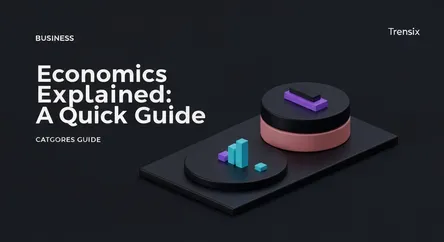Business
Economics Explained: A Quick Guide

Explore the fundamental principles of economics, the science of scarcity and choice, and see how it shapes our world and daily financial decisions.
What is it?
Economics is a social science that studies how individuals, businesses, governments, and nations make choices about allocating scarce resources to satisfy their unlimited wants. At its core, it's the study of scarcity and choice. The field is broadly divided into two main branches: microeconomics, which focuses on the behavior of individual consumers and firms, and macroeconomics, which examines the performance and behavior of the economy as a whole, including phenomena like inflation, unemployment, and economic growth.
Why is it trending?
Economic principles are perpetually relevant as they underpin global and local events. Today, discussions around inflation rates, central bank interest policies, supply chain disruptions, and the potential for a recession dominate the news. Furthermore, long-term issues like wealth inequality, the future of work with AI, and the transition to a sustainable green economy keep economics at the forefront of public and political discourse. Understanding these concepts is crucial for navigating a complex, interconnected world.
How does it affect people?
Economics directly impacts everyone's daily life. It determines the price you pay for groceries, the interest rate on your mortgage or car loan, and the availability of jobs in your area. Government policies shaped by economic theory, such as taxes and social security, affect your disposable income and retirement planning. A basic grasp of economics empowers individuals to make informed financial decisions, understand political debates, and better comprehend the forces shaping their financial well-being and opportunities.